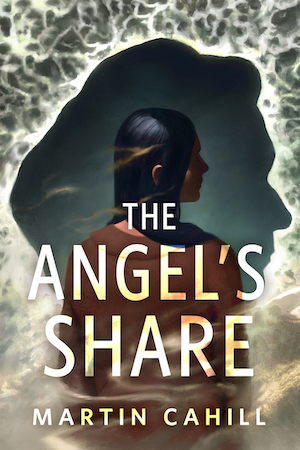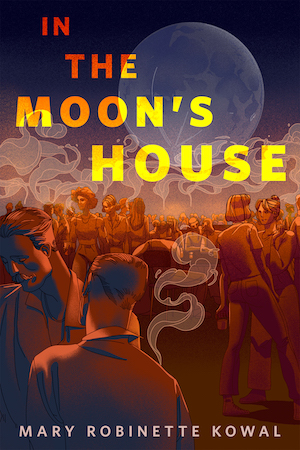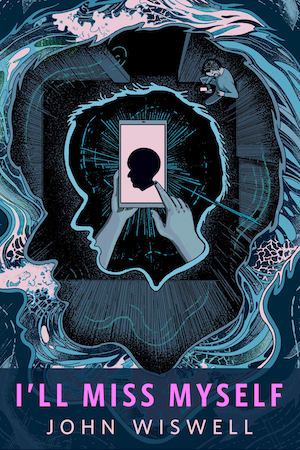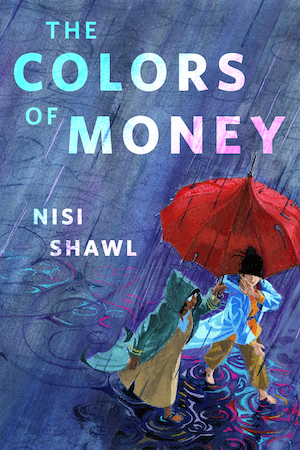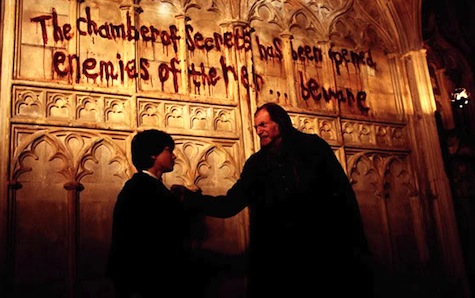Much of children’s literature creates fantastical scenarios in which the young protagonists can endure all sorts of danger that reality would never permit. It is the nature of fiction to allow us to do whatever we cannot, and when you’re a child—a point when your suspension of disbelief is at an all-time high—taking advantage of this will never be easier.
But if we stop to consider carefully, reality will eventually clock in. And it’s then when you realize that you would never make it through your education at Hogwarts. Lasting a term would be a miracle. Why do parents send their children here? It’s madness.
I understand that we’re not meant to take certain elements of the series seriously (particularly in the earlier adventures), and that some aspects of the books are engineered to ensure plot development and excitement throughout. But if I’m going to suspend my disbelief for this world, I am going for the whole package. Taking the text as Word One and leaving it there. And with that in mind… Hogwarts is a death trap. They should be sued every year or worse. The psychological scars alone would lead to a lifetime of therapy for anyone with a practical sense of mortality, and that’s without considering the constant threat of wizard war.
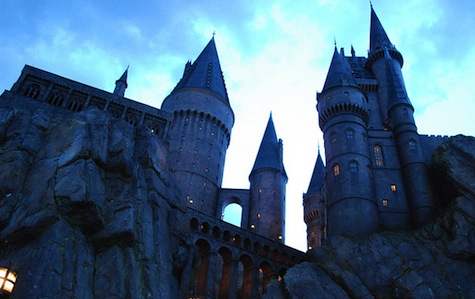
Just a few items that children can expect to encounter at the school during their education:
- The most dangerous sport in the world
- A forest containing murderous species
- One chamber leftover from a school founder that was linked to the deaths of former students
- A tree that can literally beat you
- Various creatures and components that can cause severe bodily harm during classes (textbooks included)
- A poltergeist that regularly assaults the student body
This short list contains beings, spaces, and items which are always located at the school. Not things brought in by outside forces, but what a student might run into on any given day because they are mainstays of the castle. So we must ask the question again—why would parents allow their children to attend such an institution?
Well, for one, it would seem that world’s magical population is blessed with a certain amount of… flexibility? Springy-ness? The wizarding world has more present danger day to day than the Muggle one, between the dragons and vampires and boggarts and Dark Arts. It forces one to wonder—did wizards adapt to outside dangers or did those outside dangers grow alongside the emergence of magic? Do magical peoples simply accept those dangers because they are so much more likely to encounter them over the course of life? If that’s the case, it makes sense that no one would think twice about encouraging their kid to play for the house Quidditch team, even knowing that accidents are common, injuries severe, and a fall from a broom would be far worse than a playground spill. It’s common to the wizarding experience.
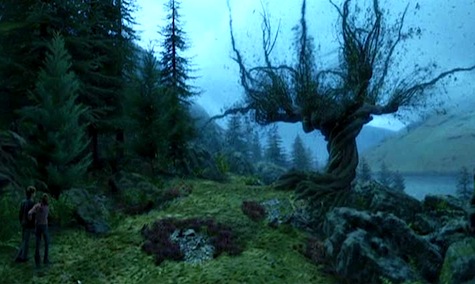
Even young children seem to have instinctual failsafes that keep them out of the danger: one of Harry Potter’s first experiences with magic is a leap he makes onto a roof when he’s being chased by cousin Dudley and his gang of goons. We know that Neville’s family only discovered he had an ounce of magical ability because his great-uncle held him out a window and thoughtlessly dropped him—leading Neville to bounce. (The Longbottom family was lucky the kid didn’t turn out to be a Squib, or they could have been brought up on murder charges, is all I’m saying.) This is more distressing when you remember that the previous family experiment involved Neville being dropped off of Blackpool pier—where he apparently nearly drowned. That lack of regard indicates that peril doesn’t register to the magical community on the same level.
When you add wizarding medicine to that—which seems effectively limitless, at least where physical injuries are concerned—it paints a picture of relative safety. Nothing too out of the ordinary, plus a nice infirmary on the grounds where bones can be regrown as they are needed. Why worry? Everything looks to be in good order, kids are fine, move along…
But potential for injury aside, what Harry and his peers encounter in their time at the school isn’t just troublesome. It’s deadly. On a regular basis. And no one seems to be bothered until Voldemort’s name gets thrown in the ring.
Take year one: Dumbledore announces in his opening speech that the third floor corridor is out of bounds to anyone who does not wish to suffer a most painful death. The announcement itself is interesting, yes, but not the key item here—it’s the student body reaction that we should be looking into. No one (aside from a few dumb First Years who don’t know any better yet) is shocked. Surprised. Put off. Raises their hand to ask a question or voice their concerns. This doesn’t seem new or different from any other year for these kids. Which means that announcements like that probably occur semi-frequently. Don’t go into Classroom H unless you’re immune to sharpened steel! Stay away from the Quidditch locker rooms for the next month while we exterminate our pixie infestation! Don’t open the green box in Professor Sprout’s office unless you’d like a dose of plague… no, the other green box!
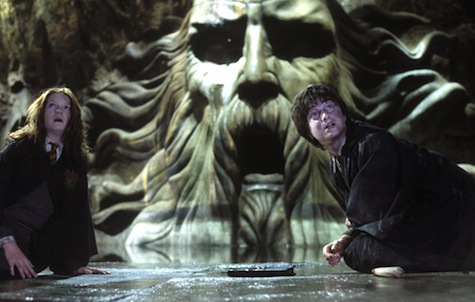
And Dumbledore’s warning is not an empty threat, as we soon find out. Neither is the reopening of the Chamber of Secrets, which gets announced via wall graffiti in one of the castle hallways. As soon as that threat appeared, every student should have been sent home, but… yeah, I got nothing. I cannot think of one single reason why school remained in session. This is like how I grew up in the one school district that never got a snow day, and we would watch cars slide across the ice as parents desperately tried to drop their kids off in the morning. It’s just like that, except the threat of a swift demise is more imminent and obvious, and—never mind, it’s nothing like me going to school on a snowy day. It’s much scarier.
Year three we get Dementors! We get prison guards at a school for a whole year because they’re worried about one escaped inmate. You know, whatever they thought Sirius Black might do if he got into Hogwarts, I can’t imagine that it’s worse than subjecting your students to that for a whole year. I know, they thought Black wanted to kill Harry, but you know THE DEMENTORS GOT CLOSER TO DOING THAT. See the problem? Every single student should have gotten Patronus training, and that’s not even getting into Harry’s near fatal Quidditch match. You know, the one where the Dementors sauntered onto the pitch and started feasting, thereby reaffirming that Quidditch is a pretty dangerous sport, seeing as Harry probably would have died when he fell off his broom had Dumbledore not intervened.
Should we bother talking about the Tri-Wizard Tournament at this point? Well, why don’t we, just for fun. After the first three years of terror, the Ministry of Magic decides that the best way to encourage magical cooperation across countries isn’t to do an exchange program or a summit or any other logical sort of gathering. They decide to resurrect a tournament that hasn’t been played in over two centuries. Why so long, you ask? Precisely because it was dangerous to pretty much everyone involved. (The 1792 Tri-Wizard Tournament saw the injury of the three judges, all Headmasters of the participating schools.) Kids have died in the tournament, in fact, but once your name gets spat out you’re in it to win it.
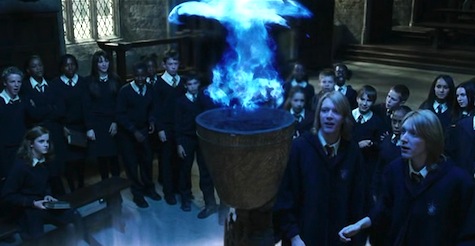
Oh, did I forget to explain that part? The part where once you’ve been selected by the Goblet of Fire, you’re stuck in a binding magical contract that forces you to see the tournament through? For some reason you’re allowed to enter into this manner of dangerous contract without the sign-off of a parent or guardian in the first place. (Again, wizard parents don’t seem too concerned.) And instead of calling the whole thing off once fourteen-year-old Harry Potter gets thrown into the ring without his say-so, they just get the year-long circus moving. The challenges are not toned down in order to make the tournament less dangerous, by the way. They are also primarily physical in nature, and rely on contact with magical beings that have no problem eating, drowning, or burning the competitors alive.
Here’s the thing—you could, ostensibly, have the Tri-Wizard Tournament without ever using the Goblet of Fire, couldn’t you? You could draw names from a hat! You could ask the students to nominate and vote on their peers! You could have the Headmasters pick their school champion after a hearty round of debate from the frontrunners! YOU COULD DO LITERALLY ANYTHING BUT THIS.
It’s no wonder that Dumbledore sees nothing wrong with letting children form an army within Hogwarts the very next year. That’s what you need to survive your education, at the very least. When Harry and Co. put their little Dark Arts fighting crew together, the wizened one was probably thinking, “About damn time. One less thing for me to worry about.”
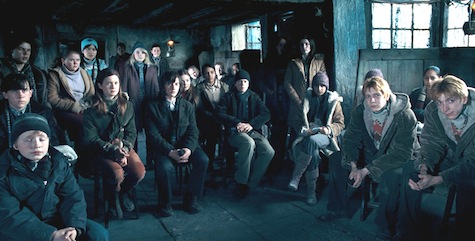
And this is without even considering freak accidents. Ill-advised sojourns too close to the Forbidden Forest. Late-night skinny dipping that leads to a worrisome encounter with mermaids. A trick step on the staircase that you forget just once. Remember everything that scared you when you were fifteen? Now imagine that, plus whatever is intent on eating you in Defense Against the Dark Arts this week. Seven years is a long time, and you’ve got plenty of chances to turn your head away right when a troll emerges during your free period.
But it oddly makes more sense of the wizarding world, considering all of this. It takes a pretty substantial amount of jeopardy for these people to show concern. If they’re willing to let their children attend a school where bodily injury is high on the probability list each day, perhaps it would take them some extra time to heed warnings of Voldemort’s return. Perhaps these students really would feel more isolated and inclined to taking matters into their own hands. It gives these kids reign to be heroes because they exist in a society where their ability to survive is not questioned quite so carefully. They are expected to endure. To bounce.
And of course, none of this means that we don’t want a ticket to Hogwarts tomorrow. It’s just good to remember that the Whomping Willow could take you and all your friends, and still have enough energy to battle a dragon.
Emmet Asher-Perrin figures that boggarts are way more terrifying as an adult, when your greatest fears are much more abstract. You can bug her on Twitter and read more of her work here and elsewhere.


